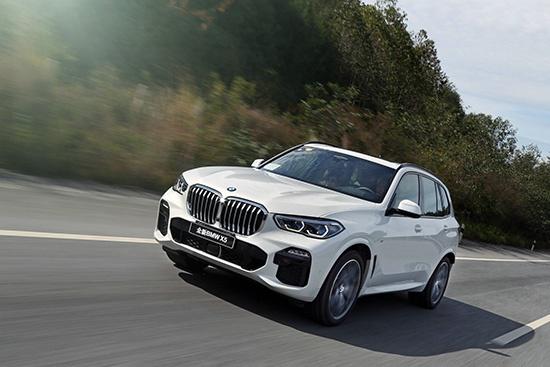Under the guidance of the new “First Strategy”, BMW Group continues to deepen the development of ACES in the field of future travel innovation, with a view to truly transforming into a leading technology company in the field of high-end travel and providing customers with leading future travel experience. Recently, the BMW Group jointly released the cross-industry white paper “Safety First in Autonomous Driving” (the “White Paper”), announcing that it has partnered with Aptiv, Audi, Baidu, Continental, Daimler, Fiat-Chrysler, HERE, British Feiling, Intel and Volkswagen Group have jointly formulated relevant standards, which marks another step forward for BMW Group in the process of realizing highly autonomous driving and fully autonomous driving.

BMW Group autonomous driving test prototype
The BMW Group has always believed that the use of the right driver assistance systems and autonomous driving technology will make travel safer. To this end, the white paper brings together all common and effective autonomous driving safety methods that meet the L3 and L4 levels of the SAE (Society of Automatic Machine Engineers) autonomous driving classification standard. The white paper provides a clear interpretation of topics related to autonomous driving safety, and will gradually realize the ultimate goal of autonomous driving technology “safer than drivers”. Its target readers include media and publishing houses, regulatory agencies, practitioners in the autonomous driving industry, insurance companies and Anyone who will be involved in future industry standardization.

The white paper analyzes the current achievements of automakers and key technology suppliers, systematically decomposes safety standards into design safety capabilities, elements, and infrastructure, and summarizes validation/verification methods, and explains the concept of positive risk balance from a statistical perspective. concept. The white paper aims to promote the establishment of an industry guidance framework and take the first step towards industry standardization, which will help all companies in the automotive mobility field, no matter traditional automakers, start-up technology companies or key technology suppliers, to have a deep understanding Autonomous driving safety.
Mr. Gao Le, President and CEO of BMW Group Greater China, said: “BMW Group is making systematic and forward-looking investment in autonomous driving, and in this process, we are most concerned about reliability and safety. The Chinese market is huge. , special traffic conditions and China’s unique advantages in digitization, China is bound to become the forefront of autonomous driving promotion. We hope to play a pioneering role in this process.”
From driving assistance to L2 automatic driving, convenience and safety at your fingertips
Autonomous driving technology is not far away from our daily life, and many cutting-edge autonomous driving technologies have been put into use in BMW mass-produced models. Models such as the new BMW 7 Series, the innovative BMW X7 and the all-new BMW X5 already provide L2 autonomous driving functions. For example, the hands-free low-speed follow-up function on these models allows drivers to let go of their hands from the steering wheel when the vehicle speed is lower than 60 km/h on high-speed and express roads with clear lane lines. , and let the vehicle follow the vehicle in front to drive automatically. When the user uses the hands-free low-speed car following function, the driver monitoring camera located on the dashboard behind the steering wheel will monitor the driver’s eyes at all times, pay attention to the driver’s state, and ensure driving safety.

The new BMW X5 already provides L2 autonomous driving functions
In addition, BMW’s first and unique automatic parking assist system in its class that automatically reverses along the record track also represents the BMW Group’s leading position in autonomous driving technology. In a narrow space or when the driver cannot clearly observe the situation behind, the system can store the vehicle trajectory when the vehicle speed is lower than 35 km/h, and make the vehicle reverse along the original trajectory through the stored last forward operation 50 meters, the application of this technology effectively solves the problem of difficult reversing in a small space.
Actively promote technological innovation, BMW leads the development of autonomous driving
The BMW Group started to develop autonomous driving technology as early as 2006. It has more than 10 years of research and development experience and has accumulated a large number of breakthrough key technologies. It is one of the pioneers in this field. At present, the BMW Group has launched more than 80 autonomous driving test prototypes around the world to provide data for machine learning of L2-L5 autonomous driving functions. The iNEXT model that BMW Group plans to put into production in 2021 will have L3-level autonomous driving capabilities.

BMW VISION iNEXT
The BMW Group always regards driving safety as the top priority, and adopts the strategy of “data-driven research and development”. It has established a data center in Munich and launched a new IT platform, laying the foundation for the development and verification of highly autonomous driving and fully autonomous driving. It will also ensure the safety and reliability of the L3 autonomous driving functions provided by BMW iNEXT. This year, the BMW Group also signed a memorandum of understanding with Daimler AG to start a long-term strategic cooperation to jointly promote the development of autonomous driving technology, with the goal of bringing the next-generation technology to the market by the mid-2020s.

New IT Platform for BMW Group Data Center
China is the pioneer market for the BMW Group to promote the “ACES” travel field, and the research and development of autonomous driving has also been actively developed. BMW has carried out in-depth autonomous driving road tests in China, and has accumulated rich practical experience and data; at the same time, it has cooperated with Chinese technology companies to make full preparations for commercial applications.
BMW is the first luxury automaker to demonstrate highly autonomous driving in China. In 2016, BMW demonstrated L3 highly autonomous driving for the first time in Chengdu. In 2017, BMW demonstrated Level 4 fully autonomous driving in Hangzhou. In May 2018, BMW obtained the Shanghai Intelligent Connected Autonomous Driving Test License in Shanghai, becoming the first international vehicle manufacturer to obtain an autonomous driving road test license in China. In July of the same year, BMW announced that it would join Baidu’s Apollo open platform as a member of the board of directors, and join hands with Baidu to accelerate the commercialization of autonomous driving technology in China.
As an automobile company with a century-old history, continuous innovation is an important driving force for it to stand among the world’s luxury automobile brands. Against the backdrop of industry transformation, the BMW Group is also actively embracing the mobility revolution in the new era with an unprecedented momentum of innovation. At the 2019 BMW Group China Science and Technology Innovation Day to be held on July 19, BMW will showcase more cutting-edge innovative technologies to drive the future of smart mobility with innovation.




